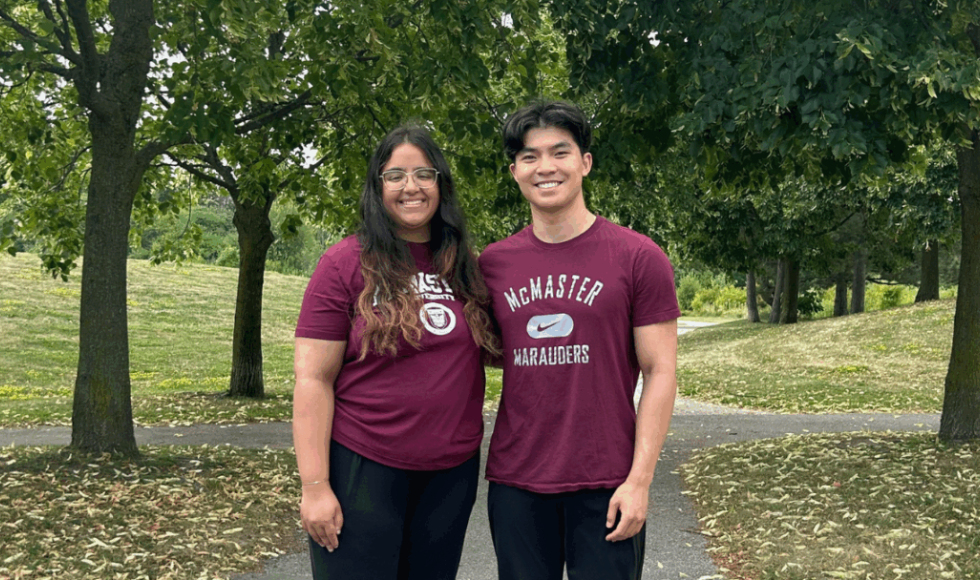Undergrad and med students team up to deliver dignity through hygiene kits

McMaster undergraduate student Myra Godara and medical student Ryan Ho teamed up to secure funding, rally volunteers, and assemble 200 kits of high-demand hygiene products for people in need across Hamilton, Niagara, and Waterloo.
When Myra Godara was finishing high school in Markham, Ont., the world was in lockdown. The COVID-19 pandemic had upended her final years of high school, replacing classroom chatter with virtual silence. So, when it came time to choose a university, she wasn’t just looking for academic excellence – she was also looking for connection.
“I really wanted that community aspect where I could talk to people, be in residence, and make new friends,” she says.
That desire led her to McMaster University, where she’s now entering her fourth year of Biochemistry with a minor in Social Justice and Inclusive Communities. And it was at McMaster that Godara found not only the community she was seeking, but also the opportunity to build one for others.
An idea to help others in need
In 2023, Godara began working as a harm reduction worker at the YWCA Hamilton’s safer injection site. There, she noticed a growing need for basic hygiene items. “People would come in and say, ‘I want everything because I don’t have anything,’” she recalls.
That moment sparked an idea: what if they could provide complete hygiene kits to clients in need?
Godara brought the idea to her supervisor, Mary Vaccaro, who also teaches at McMaster. Vaccaro connected her with a student interest group, Students for Harm Reduction and Community Outreach (SHARC), where learner Ryan Ho ran with the idea.
Ho, a first-year medical student and vice-president external for McMaster Medical Student Council , had spent years volunteering with harm reduction organizations during his undergrad and master’s in London, Ont. He immediately saw the value in Godara’s idea.
“Over the next few years, I’ll learn about pharmaceuticals to prescribe and how to diagnose, but there’s so much more to health and wellness. At McMaster, I’m learning about approaching care from a social medicine lens,” says Ho.
“Godara’s idea was tangible. It was impactful,” he adds. “You create the idea, and the output is hundreds of kits that directly benefit someone.”
Mobilizing the idea, together
Through his role on student council, Ho was aware of grants available from the Ontario Medical Students Association (OMSA).
“They happened to have their next round of funding applications open and this is exactly the kind of grassroots, student-led initiative they want to support,” says Ho.
After a vetting process, the idea was awarded $500 which translated to 200 sets of supplies ranging from toothbrushes, deodorant, soap and lotion. To bring the project to life, Ho and his peers put out a call for volunteers. They used a mix of internal channels – Instagram stories, group chats, and word-of-mouth to spread the word. Ho knew time was tight for medical students, so he kept the pitch simple: “This will only take 15 seconds of your time.”
That hook worked. “Once people put together one kit, they’d say, ‘Hey, that was pretty easy, let me do more,’” Ryan said. The assembly sessions became more than just a task and sparked important conversations about social determinants of health and the role of local outreach in medical education.
A tri-campus effort
The initiative quickly grew beyond Hamilton. Medical students at McMaster’s Niagara and Waterloo campuses joined in, assembling and distributing kits to their local YWCA branches. Godara coordinated the logistics, often driving between cities to ensure smooth delivery.
“It was a lot of driving,” she laughs, “but it was really pleasant. I got to meet students at other campuses and see how each YWCA operates.”
For both Godara and Ho, the project was about more than hygiene supplies. It was about connection, learning, and building bridges between students and the communities they hope to serve.
“I want to uphold holistic care in my future as a doctor,” Ho says. “This project helped me see how community organizations support people before they ever reach a hospital.”
Godara echoes that sentiment. “You feel like you’ve done something great for the community, and you also get to learn so much and connect with people. I got exactly what I wanted from this.”
The collaboration between undergraduate and medical students proved to be one of the most meaningful aspects of the project for Godara, who plans to apply to medical school.
“I got to learn so much about what the med program is like,” she said. “Spending real time with med students gave me insight I wouldn’t have gotten otherwise. It was exactly the kind of networking and mentorship I hoped for.”


